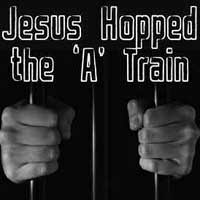Jesus Hopped the “A” Train
By Stephen Adly Guirgis
Directed by Anish Jethmalani
Produced by Eclipse Theatre Company, Chicago
An Early Work by Guirgis a Sign of Big Things to Come
A new season for Eclipse Theatre means a new playwright to be spotlighted for a year, and Stephen Adly Guirgis is just the one to demonstrate theatre’s continuing relevance and vitality. From The Last Days of Judas Iscariot to The Motherfucker with the Hat, the New York-based Guirgis often wrestles with themes of responsibility, guilt, and justice in plays with a Christian framework and colorful language employed by a diverse array of urban characters. So, too, is the case with his early work, Jesus Hopped the “A” Train, which starts Eclipse’s season with an emotionally piercing production directed by Anish Jethmalani. Written in 2000, this play is set in the still-notorious Rikers Island jail, and examines the spiritual condition of two very different murderers, and how society reacts to them.
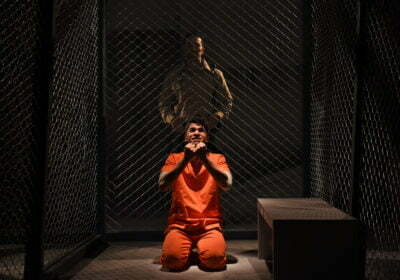
The first character we see is the subtlety named Angel (Jonathan Nieves), a young prisoner who is desperately trying to remember The Lord’s Prayer. The neighbors are not sympathetic, and he is beaten by a guard for causing a disturbance. Meanwhile, in protective custody, Lucius (D’Wayne Taylor), whom the media has nicknamed “The Black Plague,” is exercising in a cage, proclaiming his love for the Lord, and charming his guard, D’Amico (Zach Bloomfield) into giving him cigarettes, sweets, and whatever small comforts he desires while he fights extradition to Florida. However, easy-going D’Amico is soon replaced by hard-nosed Valdez (Christian Castro), a bitter former garbage man who hates people who throw away precious things. Having murdered eight boys and young men for sadistic pleasure, Lucius would be the epitome of a person who wastes what is valuable, and Valdez proudly unleashes a tirade of bigoted slurs against his prisoner and warns him that the constitution does not apply under his watch.
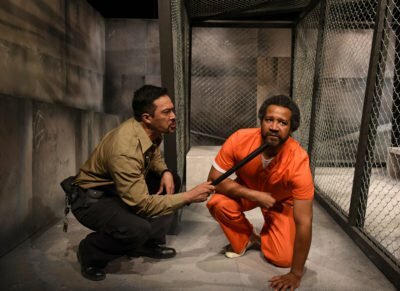
Angel gets off on the wrong foot with his public defender, Mary Jane (Elizabeth Birnkrant), who confused him with another prisoner and is exasperated with his inability to grasp the illegality of his actions. Angel shot Rev. Kim, the leader of a Moonie-like church, who brainwashed and isolated the boy who had been Angel’s life-long best friend. Angel maintains that, because he only shot Rev. Kim in the ass, and because Rev. Kim deserved it, it is not in the interest of justice to prosecute him. The more Mary Jane thinks about it, the more she sees things from Angel’s point of view, and is willing to put him on the stand, even though it means suborning perjury. However, when Rev. Kim dies, and Angel is raped, his is transferred to solitary, where he spends an hour a day in a cage next to Lucius. The self-called saved serial killer’s preaching gets to him, but his skepticism affects Lucius in a way Valdez’s does not, and both men’s self-perceptions are deeply shaken.
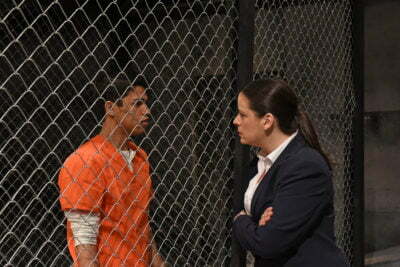
Angel is written as dumb and in severe distress for most of the play. Therefore, it is a testament to the very young Nieves’s skill an actor that he is sympathetic and likeable. That’s mostly because he conveys pain and confusion so well, but we also understand the psychology behind why, exactly, Angel is confused. He sees himself as responsible for other people’s decisions, but not his own, and that immature mindset is what lands him into deep trouble. Taylor’s performance requires intense physicality, as Lucius regards exercise as about the only thing left he can do to purify himself. He’s so friendly (in contrast with the anxiety-ridden agoraphobe he claims to have been during the killings) that you want to believe Lucius has been redeemed, but there’s no evidence for that, and since he’s under tight security until his execution, he never will be able to prove it. Instead, Taylor presents us with a fascinating mystery. The men’s scenes together are thankfully as intense when they’re quiet or borderline friendly as when they’re shouting.
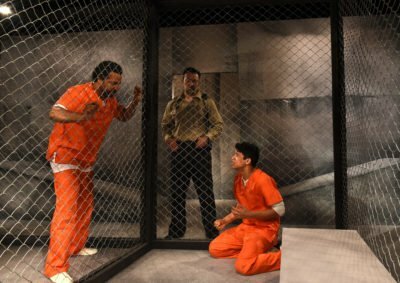
The other actors do fine with their characters, who are written to mostly speak through direct-address. Their monologues are all interesting, at least, but Guirgis was mainly interested in having Angel and Lucius debate. In fact, he was more interested in spiritual conflict than he really was in exploring the legal system, as demonstrated by Mary Jane risking her career for Angel and doing extraordinarily well with a strategy which depends on jury nullification. This is the sort of thing you either accept with Guirgis’s early work or you don’t. If you do, then the language in which his characters grapple with the esoteric is delightful, though the content of their arguments is the kind a person without formal education in theology can follow. A problem with the Athenaeum’s studio spaces, which I’ve noticed before, is that when a set is basically a three-sided box, as Kevin Scott’s is, the actors’ voices tend to get trapped inside it, and Guirgis’s characters speak at a rapid-fire pace. The actors have excellent diction, however, and Jethmalani understands Guirgis’s irony and comedic timing, so the play’s humor comes through as well as its heaviness. The seams of this plot show if you want to look for them, but the debate about the morality of violence and forgiveness is fascinating, and the performances prevent it from becoming too abstract.
Recommended
Jacob Davis
Reviewed April 17, 2016
This show has been Jeff recommended.
For more information, see Jesus Hopped the “A” Train’s page on Theatre in Chicago.
Playing at the Athenaeum Theatre, 2936 N Southport Ave, Chicago. Tickets are $30, with discounts for groups, students and industry; to order, call 773-935-6875 or visit eclipsetheatre.org. Performances are Thursdays-Saturdays at 7:30 pm and Sundays at 2:30 pm through May 22. Running time is two hours and fifteen minutes, with one intermission.

